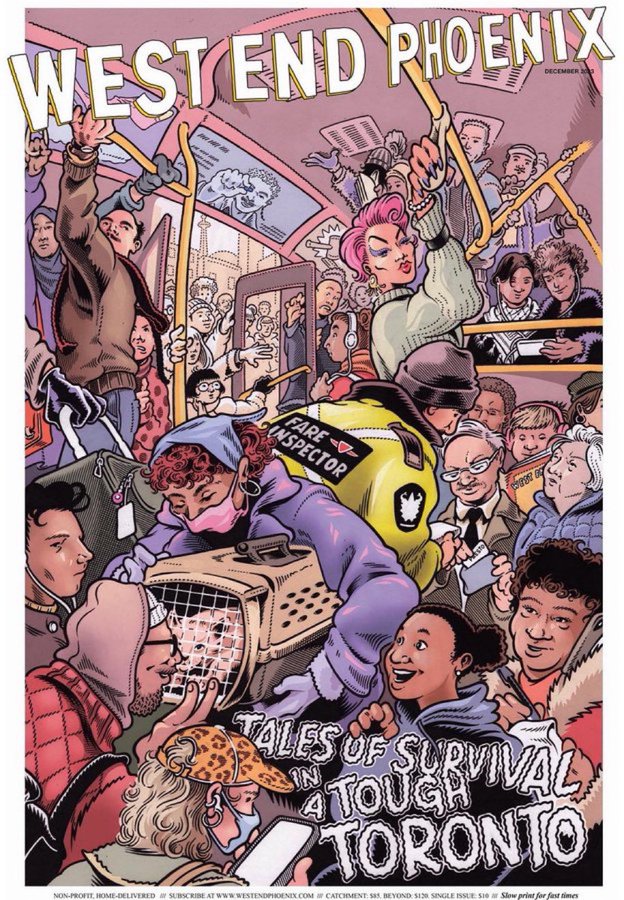The news media in Canada is in crisis. Policy responses to date are failing to solve for the information that citizens need to make informed decisions about important issues and debates. The Future of News series brings together leading practitioners, scholars, and thinkers to imagine new business models, policy responses, and journalistic content that can support a dynamic future for news in Canada.
If you ever find yourself driving west down Toronto’s bustling Bloor Street and make a right-hand turn at Bartlett Avenue, you’ll find the small unassuming office of the West End Phoenix. Nestled behind a pharmacy and a parking lot, the graffiti-laden newspaper headquarters can be hard to miss. But the Phoenix is anything but for those living in the city’s west-end neighbourhood.
Founded in 2017 by writer and musician Dave Bidini, the Phoenix has become a monthly fixture in Toronto’s west end. At a time when community newspapers are folding and larger print publications are in decline, how has this relatively new print paper managed to thrive in Canada’s largest city?
A non-profit model of funding involving a variety of donors and patrons, door-to-door advertising to local residents, and the founder’s reputation have helped make the Phoenix a success. A subscription for home delivery of the paper costs $85 per year. At the end of the day, however, Bidini says the quality and focus of the Phoenix’s journalism is what convinced west-end residents to buy pre-print subscriptions when the paper began seven years ago.
“I found out that if something arrived on your porch that had really good writing, that looked beautiful and told stories from the neighbourhood, people would want to read it and would pay 70 bucks for it,” he says in an interview with The Hub.
The viability of the non-profit model
In 2023 alone, at least 36 local news outlets shut down across Canada, with 29 being community newspapers. In total, 516 Canadian print, local radio, TV, and online news outlets have closed since 2008.
The Pheonix’s name comes from the idea that it is a paper rising from the ashes of those outlets we have lost. At a time when major for-profit newspapers such as the Toronto Star and the National Post are even experiencing big yearly losses, laying off staff, and abandoning physical offices, the Phoenix is taking a different approach.
“We started as a non-profit. We started like every other newspaper in the sense of there being no profit,” says Bidini. “It’s a popular model, and not just popular here. There are a lot of non-profit media organizations.”
Jon Willing, a professor of journalism at Algonquin College in Ottawa, agrees the non-profit model is becoming more and more common for Canadian journalistic outlets. For example, the Walrus magazine and the online outlet True North are both registered charities.
“I think journalists are really interested in that model—not having one shareholder at the end of the day trying to make a great profit off of a news product,” says Willing. “Essentially, just having an organization paying their staff a good dollar to do great journalism. Paying for the overhead, and hopefully, you have the funders, or patrons, or subscribers, or even the ad revenue to sustain those operations.”
The Phoenix began with 800 pre-publication subscriptions. Bidini believes part of its appeal to people in the community was actually its non-profit status.
“It’s easier to tie that to the greater good, right?” he says. “Nobody’s in it to make a ton of bucks. People have it because they love it.”
Bidini’s profile helped attract donors and patrons
The Phoenix keeps its lights on by tapping a variety of funders. While the outlet, which actually prints a physical newspaper, does receive annual funding from the federal government, most of its money comes from patrons and donors. Local craft breweries have even chipped in. It also receives financial help from institutions including the Bank of Montreal. Surprisingly, it does not receive grants from arts bodies.
Bidini acknowledges his career as a well-known musician and a writer—he was a founding member of the indie rock band Rheostatics and has written more than 10 books—helped him tap into a network of Toronto artists who he could call upon for help.
Supporters have included some of Canada’s most well-known writers, including Margaret Atwood and Life of Pi author Yann Martel.
Five years ago, Prime Minister Trudeau even visited them.

“The story of local journalism that is resonating and that people are appreciating, and is not just reflecting a vibrant culture in the neighbourhood, but contributing to it is really really important,” he told Phoenix staff. “I know you like being unique but I hope there’s going to be a lot of copycats…in neighbourhoods like this across the country.”
Bidini points out that many Phoenix stories are funded with the direct support of non-government organizations and charities.
A story called “Renters on the Brink”, about the struggles of renting in Canada’s most populated city, for instance, was made possible through a partnership and financial support of Maytree, an organization that tries to find solutions to alleviating poverty.
Another story, called “Punching Tomorrow” about a boxing gym that offers free lessons to people from underserved communities, was made possible by the Joe Burke Journalism Fund for Social Justice Reporting.
Success is only sustained by quality journalism
Willing says while Bidini’s profile is responsible for a fair amount of the paper’s initial success, at the end of the day it is only quality journalism that will guarantee its success and the success of similar outlets going forward.
“My hope is other community-like news sources will be able to attract attention from an audience and hopefully from funders through the good journalism that they’re doing,” he explains. “I think good journalism is the thing that’s going to win over readers at the end of the day.”
Bidini is committed to providing the good journalism that his readers are craving. The Phoenix’s writers range from local west-end poets and illustrators to artists around the world. Writer and poet Michael Ondaatje recently gifted a poem to the Phoenix for publication in a future edition.
“There are allies everywhere who are great artists,” the Bidini explains.
The editor-in-chief notes that although they are a local paper covering Toronto’s eclectic west end, that doesn’t and shouldn’t limit them from shying away from tackling more wide-ranging subjects.
“We’ll write about the butcher. We’ll write about the person making chili in their garage,” he says. “But there are also much broader think pieces about democracy and housing and education and the police. And studying the way those issues are addressed.”

The growing mix of donations, subscriptions, and other funding sources enabled the Phoenix to open a physical office in March of last year. It has also hired new staff to manage its Instagram and X accounts.
However, Bidini stresses that the newspaper will remain first and foremost focused on print journalism.
The Phoenix’s slogan—“Slow print for fast times”—emerged during a casual conversation Bidini had over dinner. For the musician turned journalist, it reflects the belief that people should put their phones down once in a while, even for 20 or 30 minutes, pick up a real paper, focus their thoughts, and read a long-form story. And not be afraid to get their thumbs dirty with ink.
“We want to get people to dwell on [the content] a little bit more—the way you would study a painting or listen to a five-minute song—and engage with it on a level that draws you a bit deeper into it,” Bidini concludes.
The Future of News series is supported by The Hub’s foundation donors and Meta.
Recommended for You

‘Canadian companies should seize the moment’: Cameron Schuler on AI’s deep history and bright future in Canada

Peter Menzies: Pierre Poilievre has the government-funded media spooked

‘Hopes and fears’: The Hub reacts to President Trump’s inauguration and what it means for Canada

Alicia Planincic: Why America’s trade deficit with Canada is not the problem Trump thinks it is




